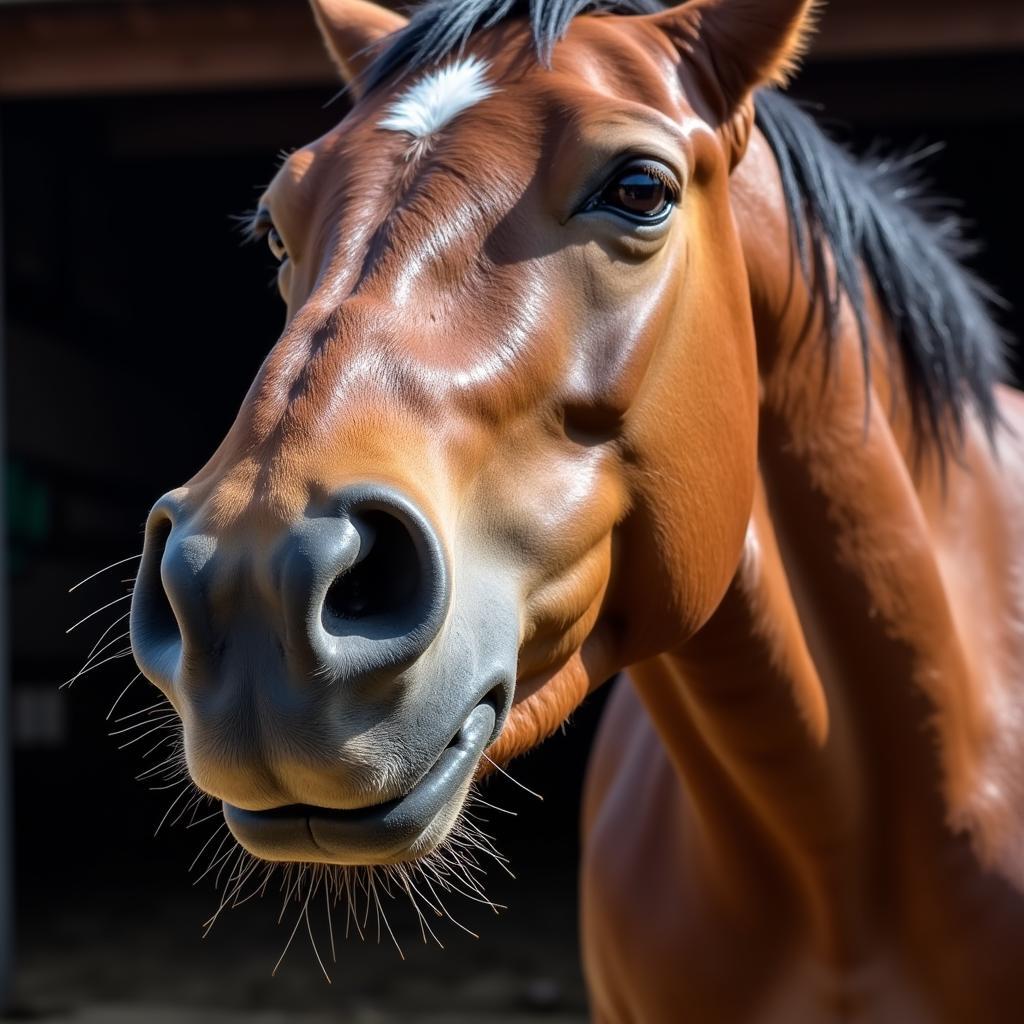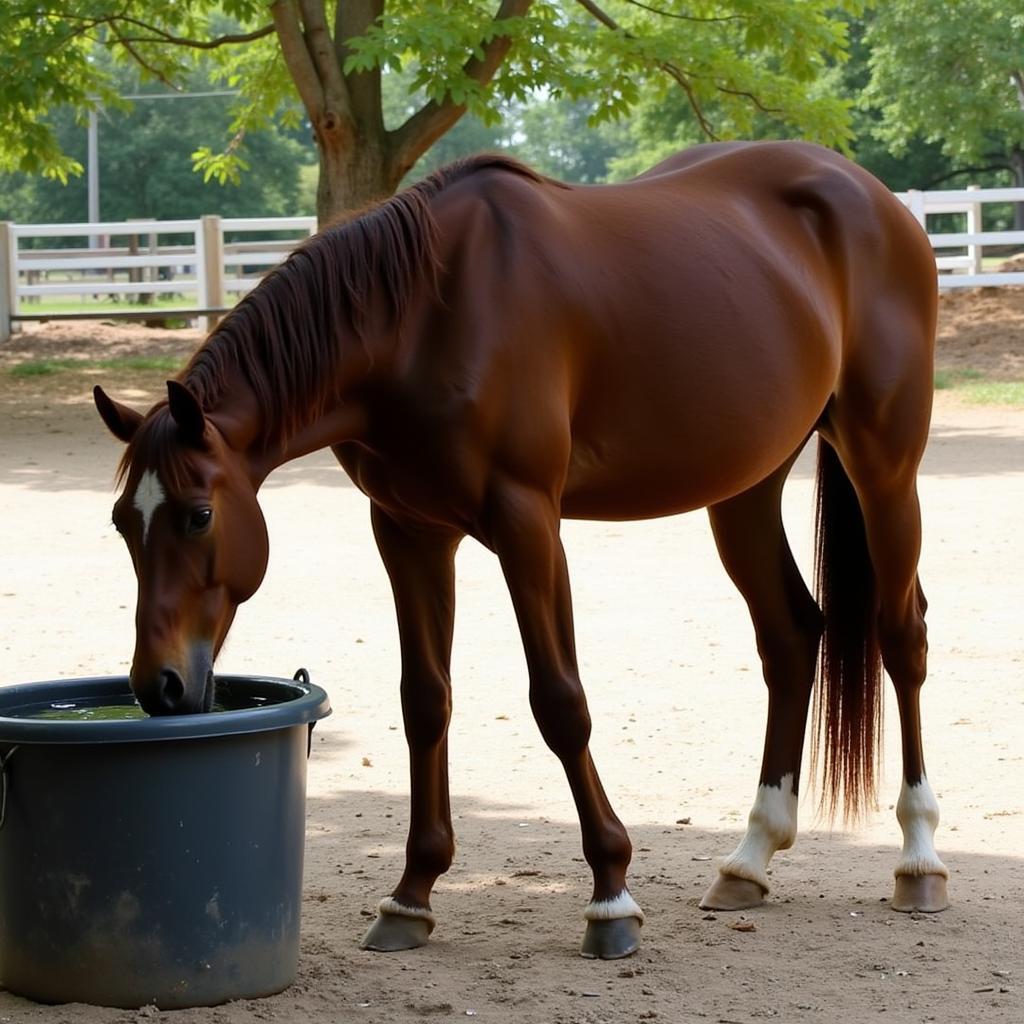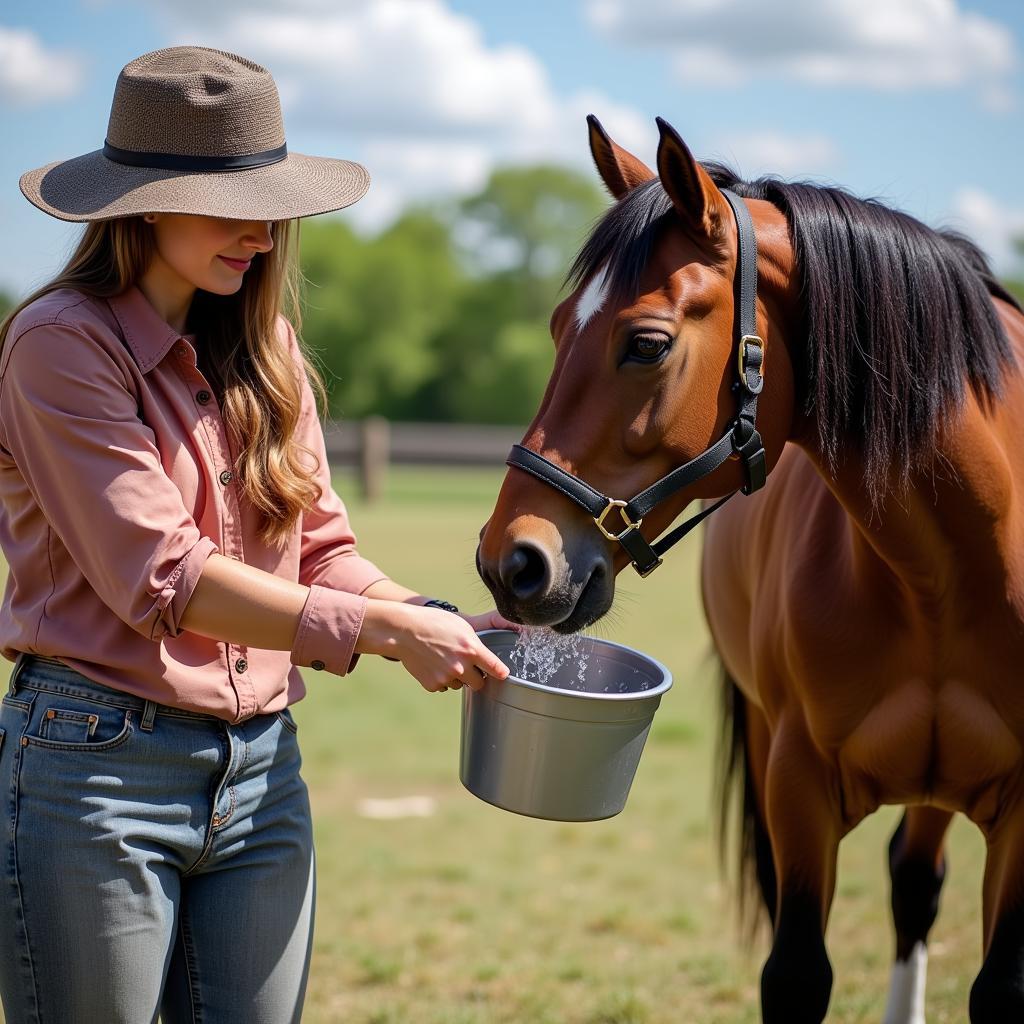Horses, like all living creatures, have an optimal temperature range for comfort and performance. While they’re remarkably adaptable animals, extreme heat can pose serious health risks. Understanding the signs of heat stress and knowing how to keep your equine companion cool is crucial, especially during scorching summer months.
Recognizing the Danger Zone: When Does Heat Become a Threat?
You might be wondering, “What Temperature Is Too Hot For Horses?” While there’s no magic number, most horses begin experiencing heat stress when the temperature climbs above 80 degrees Fahrenheit. However, factors like humidity, direct sunlight, wind speed, and your horse’s individual characteristics (breed, coat color, age, and fitness level) can significantly impact their ability to regulate body temperature.
 Horse Showing Signs of Heat Stress
Horse Showing Signs of Heat Stress
Decoding the Warning Signs: How to Tell if Your Horse is Overheating
Horses can’t tell us when they’re hot, so it’s vital to be observant. Early detection of heat stress is crucial for preventing severe health issues. Here are some telltale signs your horse might be struggling:
- Elevated Respiratory Rate: Rapid, shallow breathing or panting is one of the first indicators of heat stress.
- Increased Heart Rate: A racing heart makes it difficult for a horse to cool down efficiently.
- Profuse Sweating: While sweating is normal during exercise, excessive sweating, even at rest, can indicate heat stress.
- Lethargy and Reduced Appetite: A horse suffering from heat stress might seem unusually tired, depressed, and lose interest in food.
- Dark or Discolored Urine: This is a sign of dehydration, a common consequence of heat stress.
- Stumbling or Loss of Coordination: In severe cases, heat stress can lead to neurological problems, causing stumbling and difficulty walking.
Beat the Heat: Strategies for Keeping Your Horse Cool and Comfortable
Keeping your horse safe during hot weather requires proactive management:
- Provide Ample Shade: Ensure your horse has access to a shaded area, such as a well-ventilated barn, a run-in shed, or natural shade from trees.
- Fresh, Clean Water is Essential: Horses need unlimited access to cool, clean water, especially during hot weather. Consider adding electrolytes to their water to replenish lost minerals through sweat.
- Adjust Exercise Routines: Limit strenuous activities during the hottest parts of the day. Opt for early mornings or cooler evenings when the sun’s intensity is lower.
- Cooling Baths and Misting: A refreshing bath or regular misting can work wonders. Focus on cooling the horse’s legs, neck, and chest, where major blood vessels are located.
- Consider Fans and Ventilation: If your horse is stabled, ensure proper ventilation with fans and open windows.
- Electrolyte Supplements: Electrolytes help replace essential minerals lost through sweating, supporting hydration and overall health.
 Horse Drinking Water From a Bucket
Horse Drinking Water From a Bucket
Expert Insights: Dr. Emily Carter on Equine Heat Stress
“Heat stress is a serious concern for horse owners,” says Dr. Emily Carter, a renowned equine veterinarian. “Knowing the signs and taking preventive measures can mean the difference between a healthy, happy horse and a potentially life-threatening situation.”
Dr. Carter emphasizes the importance of carefully monitoring horses during hot weather: “Don’t wait for your horse to collapse from heatstroke. By then, it might be too late. Early intervention is key.”
Prioritizing Your Horse’s Well-being
 Horse Owner Offering Horse Water
Horse Owner Offering Horse Water
Understanding how heat impacts horses is essential for responsible ownership. By recognizing the signs of heat stress and implementing preventative measures, you can ensure your equine companion stays safe and comfortable throughout the summer months. Remember, a cool horse is a happy horse!
FAQs: What Temperature is Too Hot for Horses
Q: Can horses tolerate heat better than cold?
A: While horses are adaptable, they generally handle cold better than extreme heat. Their thick winter coats provide insulation, and they can tolerate freezing temperatures. However, they struggle to regulate body temperature in high heat and humidity.
Q: What are the long-term effects of heat stress on horses?
A: Repeated or severe heat stress can lead to lasting health issues, including respiratory problems, muscle damage, and decreased performance.
Q: Are certain horse breeds more susceptible to heat stress?
A: Yes, breeds originating from cooler climates, such as draft horses and some warmbloods, are generally more susceptible to heat stress. Their thicker coats and larger body mass make it harder for them to cool down.
Q: Can I still ride my horse in hot weather?
A: It’s best to avoid strenuous riding during the hottest parts of the day. Opt for early mornings or evenings when the temperature is cooler. Always monitor your horse closely for signs of heat stress.
Q: What should I do if I suspect my horse is suffering from heatstroke?
A: Heatstroke is a life-threatening emergency. Immediately contact your veterinarian and move your horse to a shaded area. Cool the horse down by hosing it with cool (not cold) water, focusing on the legs, neck, and chest.
Learn More About Horse Care
For more information on keeping your equine companion healthy and happy, check out these resources:
Remember, a well-informed horse owner is a responsible horse owner.
Let’s prioritize equine well-being together!
Need assistance with your horse’s care?
Contact us:
Phone Number: 0772127271
Email: [email protected]
Address: QGM2+WX2, Vị Trung, Vị Thuỷ, Hậu Giang, Vietnam
Our dedicated customer support team is available 24/7 to assist you.